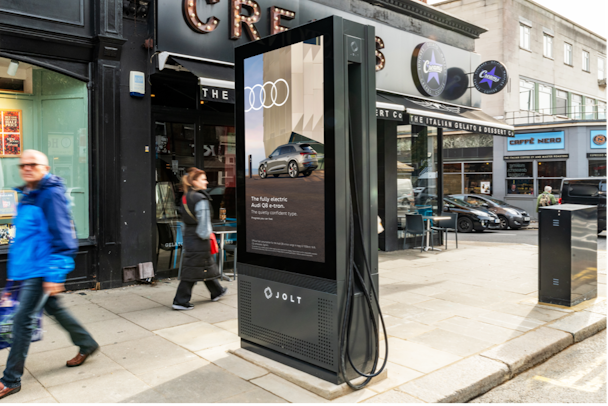Can this EV charging network’s ad-funded model make the market more accessible?
Jolt, which is bringing its ad-subsidized EV charging stations to the UK, describes its offering as a win-win for advertisers and electric vehicle owners. Will cities feel the benefit, though?

Jolt launches in the UK this week with ad partners including Audi / Jolt
Founded in Australia by Doug McNamee, Jolt is a digital OOH and electric vehicle (EV) charging station network that provides drivers with 7kWh of free, fast, roadside EV charging a day (worth £840 annually), with as little as 15 minutes charge time and doing away with the need for home charging facilities.
This week, it announced its launch in the UK, in the North London Borough of Barnet.
McNamee tells The Drum he came to the idea for the company from a consumer’s perspective. “I had just bought an EV myself and converting my garage into a charging station was going to cost me as much as the car, so I realized I was going to have to rely on public charging infrastructure. But we were super far behind in Sydney – only two charging stations in a city of 5 million people.”
Advertisement
He explains that, from his experience in media (McNamee was previously commercial and strategy director at Reed Pacific Media), he knew that if he could find street locations that had panels and audiences that were effectively the same as a regular street furniture buy, he would also be able to deliver a service with EV charging. “It became the key to unlocking this.”
Jolt does not take advertising from fossil fuel companies, naturally, with McNamee saying this would be a conflict of interest. But he says he’s well aware of the social license to operate that large-scale advertising provides: “Advertisers choose us because it’s a safe environment where they can advertise contextually to a highly desirable audience who otherwise may not be available to them.”
Advertisement
Jolt also announced this week that its category-exclusive advertising launch partners will be Audi, Aviva and EDF.
McNamee believes Jolt is a win-win, both for advertisers and city councils. “The city can deliver charging stations where it otherwise couldn’t and advertisers reach an audience they otherwise wouldn’t.” By directly addressing barriers to EV ownership, such as high costs and availability of public and home charging infrastructure, McNamee says Jolt also aims to help accelerate e-mobility in the UK in a way that is equitable and sustainable.
But the subsidized cost comes with a caveat. Each Jolt charging station features double-sided D6 screens, turning central roadside spaces into “interactive opportunities for brands to connect with highly engaged environmentally conscious and desirable audiences.” The first charging stations are in Barnet in London, though hundreds will be rolled out across the city in the coming months, says McNamee. There will be thousands nationwide over the next few years.
Suggested newsletters for you
However, Adfree Cities, a network of groups that want to reclaim ad space for public use, says that it’s unfortunate that accessible and affordable EV charging stations are at the whim of a private company. “It is a regrettable feature of Anglo-American capitalism that the provision of public services such as EV charge points, bus stops or bike hire schemes must be accompanied by corporate ad slogans and sponsorships. Wherever we turn, someone is trying to advertise at us. We can do much better for our public spaces,” the group’s director, Robbie Gillett, tells The Drum.
He adds that the advertising element of the Jolt stations is also unnecessarily large. “A regular charge point should only occupy one-fifth of the space taken up by these ad screens. This matters because London councils are supposed to be committed to reallocating scarce street space away from cars to pedestrians, but huge charge points installed on busy pavements do the opposite.”
A report penned by the climate organization Possible, in collaboration with inclusive cycling charity Wheels for Wellbeing, warns that the rollout of public infrastructure for EV charging points could significantly impact disabled people and jeopardize targets to increase walking and cycling trips within cities.
“Ensuring active travel is a viable option for all is just as important for meeting climate targets as changing the way cars are fueled, but to do that, we need to be removing clutter from footways, not adding to it,” says Leo Murray, co-director at Possible.

